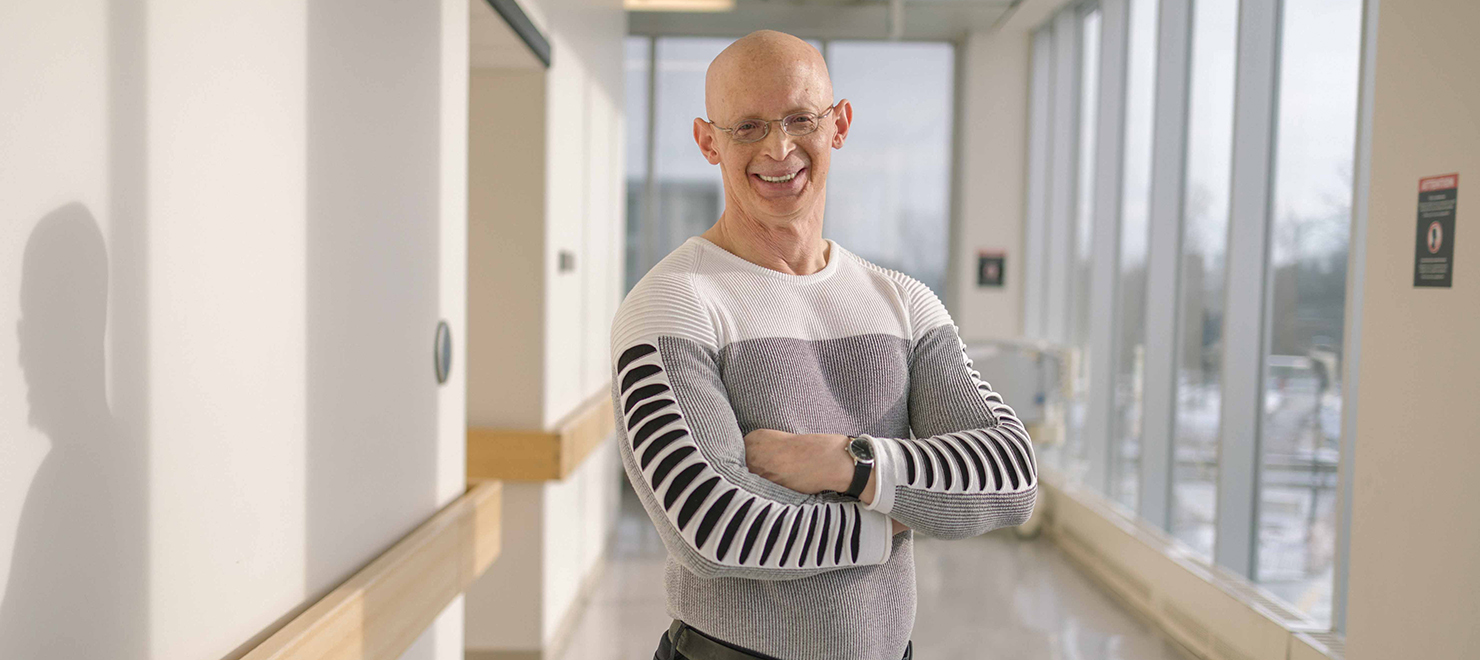
If there is one thing that Dr. Paul MacPherson wants gay men in Ottawa to know, it’s this: “The Ottawa Hospital is working towards relevant health-care delivery for you,” he says. “We’re not there yet, but we’re committed to getting there.”
A milestone for gay men’s health
As both a researcher and a gay man, Dr. MacPherson knows all too well the stigma, stereotypes and misinformation that gay men often encounter in the health-care system. He has dedicated much of his career to breaking down these barriers by helping health-care providers become more attuned to the unique care needs of gay men.
“I want to make health care more accessible and relevant to gay guys,” says the physician-scientist with The Ottawa Hospital’s Clinical Epidemiology Program. “And I want to make gay men’s health less of a mystery to care providers.”
Beginning this year, Dr. MacPherson will have the tools he needs to chip away at even more barriers—and maybe even knock them down completely.
He has just been named Clinical Research Chair in Gay Men’s Health, a new academic role at The Ottawa Hospital and the uOttawa Faculty of Medicine that is also the first of its kind in any Canadian hospital. The Chair was the brainchild of a gay man in our community who championed the idea to The Ottawa Hospital Foundation.
The Ottawa Hospital’s Research Institute and the University of Ottawa helped to make this Chair a reality through the Faculty of Medicine’s Clinical Research Chair program. The role was made possible through the generous support of the Department of Medicine, in addition to community support through The Ottawa Hospital Foundation.
In this important new role, Dr. MacPherson and his team of researchers will work towards filling some of the biggest gaps that gay men face in the health-care system.
“We will address these issues through a two-pronged approach of educating health-care providers on comprehensive gay men’s health and developing clinical programs that acknowledge and are relevant to gay men,” explains Dr. MacPherson. “And we’ll be reaching out to the gay community to get their feedback and to give them peace of mind that these issues are being addressed.”
Survey reveals significant gaps in care
Dr. MacPherson conducted a survey of gay men in Ottawa which shed light on the many difficulties they face in receiving quality care.
“In Ottawa, a quarter of gay men do not disclose their sexual orientation to their health-care providers. And in the towns outside the urban core, that number goes up to almost 50 percent,” he reports. “They’re afraid of what kind of reaction they’ll get if they disclose. That is a huge barrier to health-care delivery.”
“We found that health-care providers screened these men for common health conditions like diabetes, heart disease and high blood pressure. But perhaps out of not knowing they were gay or not knowing what some gay men’s health issues were, they were overlooking mental health issues and other sexual health problems like sexual dissatisfaction and anxiety. All these things were being missed.”
A focus on mental and sexual health
Based on the survey results and his conversations with gay patients, Dr. MacPherson plans to prioritize mental and sexual health.
“In the population from our survey, there are very high rates of depression and anxiety,” he elaborates. “Seventeen percent of gay men in Ottawa and 24 percent province-wide exhibit symptoms of depression. Sixteen percent reported childhood sexual abuse, and 35 percent reported a history of physical abuse—being kicked, slapped or punched—by a family member. These are very troubling mental health statistics that we need to address. We need to find ways to help guys come forward with their issues, and we need to provide them with relevant programming to help them recover or cope.”
These unaddressed mental health issues can also impact sexual health. “Our data found that 24 percent of gay guys find sex stressful at least half the time,” he explains. “We need to work on making sex a more satisfying and pleasurable experience.”
Currently, sexual health programs for gay men tend to ignore the emotional aspects of sex, focusing exclusively on STI and HIV treatment and risk reduction. Dr. MacPherson wants health-care providers to take a more comprehensive approach—and that means they must be prepared to sit down and have meaningful conversations with their patients.
“Very few physicians and nurses are comfortable talking about sex between men in any way that would be helpful to patients,” he says. “We need to help them become more comfortable. We need to do a lot of training with them. Right now, we are also developing a comprehensive guide for primary care providers on how to care for gay guys. We want providers to know what to think about and what to look for.”
A model for minority health in Ottawa and beyond
Looking to the future, Dr. MacPherson hopes to create meaningful change in the lives of gay men in Ottawa and inspire health-care providers across Canada to adopt similar programs.
“I hope to set a standard and a model for addressing barriers faced by other minorities,” he says. “And I don’t just mean sexual minorities. There are lesbians and trans folks but also refugees and people living in poverty. They face unique barriers that also need to be addressed.”
HUGO: A great resource for gay men and health-care providers
A few years ago, Dr. MacPherson and The Ottawa Hospital launched Health Unlimited for Guys in Ontario (HUGO). HUGO is a website that provides gay men with helpful resources and educational activities on physical, mental and sexual health. HUGO also has a great learning hub for health-care professionals, featuring training modules on delivering quality care.
“This has been an important step forward for gay men’s health in Ottawa,” says Dr. MacPherson.
Dr. MacPherson and The Ottawa Hospital invite you to stop by HUGO today.
Support patient care and research at
The Ottawa Hospital
You might also like…
Dream vacation becomes nightmare after COVID-19 strikes
Sun and sand turned to fear and uncertainty when Jim and Joanne Booth, married for 57 years, tested positive for COVID-19 in March 2020. Read about their journey back home to receive life-saving care at The Ottawa Hospital.









